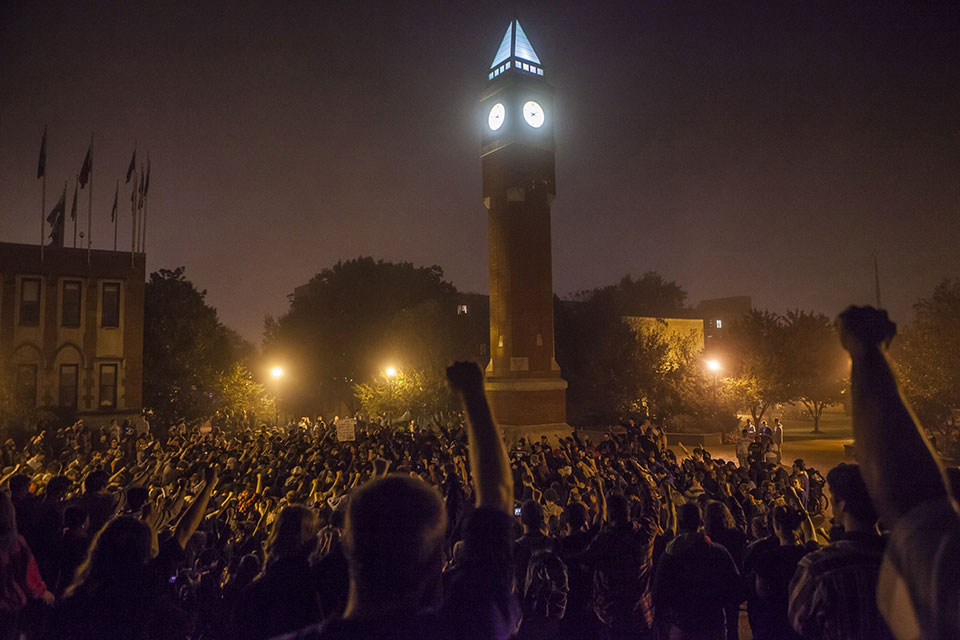SLU’s Clock Tower Accords: A Catalyst for Institutional Change
Bridjes O'Neil
Communications Specialist
bridjes.oneil@slu.edu
314-282-5007
Reserved for members of the media.
In honor of Black History Month, Saint Louis University reflects on the Clock Tower Accords, which have brought long-lasting cultural and structural changes to SLU.
This includes the creation of the Office of Diversity and Community Engagement – now known as the Division for Diversity and Innovative Community Engagement (DICE) – founded by the late Jonathan Smith, Ph.D., SLU’s inaugural chief diversity officer.
Shortly before Smith's passing, he and Amber Johnson, Ph.D., (A&S ’01, Grad A&S ’02), collaborated to envision new ways to bolster the efforts of the office, resulting in a new Associate Provost position. Johnson now serves as the interim vice president of DICE and pledges to uphold and realize Smith's legacy and vision.
“Jonathan forged strong bonds of common human purpose and shared values across the distinctions of race, class, gender, sexual identity and faith."
Amber Johnson, Ph.D.
DICE formally launched during the 2021 Occupy SLU Week, Oct. 8-15. Occupy SLU was a peaceful occupation at the campus clock tower across six days in October 2014, following the officer-involved shootings of two African American young men: Michael Brown Jr. in Ferguson, Missouri, and VonDerrit Myers Jr., the son of a long-time staff member, VonDerrit Myers Sr., in the nearby Shaw neighborhood of St. Louis.
Occupy SLU ended with the adoption of the Clock Tower Accords, a 13-point agreement reaffirming the University’s Jesuit values and its formal commitment to diversity, equity and inclusion (DEI).
Below are key highlights from the agreement the University has implemented:
In the fall of the 2021-2022 academic year, SLU became the fourth Jesuit university in the nation to formally establish a Department of African American Studies. Christopher Tinson, Ph.D., who previously served as program director, became the department’s first chair.
SLU has made intentional efforts to attract, retain and support African American student populations. Since 2014, more African American high school graduates have enrolled at SLU. For the 2021-2022 academic year, SLU enrolled the second largest and most diverse freshman class in history. More than 22% of new freshmen were students of color, a 5% increase from 2019. First-generation college students comprised 25% of incoming students, an 8% increase from 2019.
SLU boosted the average total of grants awarded to economically disadvantaged students, including eligible African American students, by 17% since 2014. SLU admitted 22.9% Pell Grant eligible students, up 2% from 2019. The Jonathan C. Smith, Ph.D. Memorial Endowed Scholarship was established to support SLU students who graduated from St. Louis-area high schools who demonstrate a commitment to DEI.
In 2017, SLU was awarded a five-year McNair Scholars Program grant valued at $1.2 million or $240,000 per year. The McNair Scholars Program is a federally funded and nationally recognized TRIO program that prepares eligible, high-achieving undergraduate students for doctoral studies.
Staff from DICE, Student Development, and the Office of Enrollment Management are working together to help remedy the myriad challenges that could stress individual African American students and lead to their withdrawal from school.
This includes creating the Billikens' First Chapter (now RISE), hiring two new staff members specializing in recruitment, retention, and leadership development as special assistants to the vice president of DICE, and establishing equity and wellness programs designed to promote human flourishing for SLU’s most marginalized and vulnerable students.
The Cross Cultural Center for Global Citizenship, formerly Cross Cultural Center, launched the Audre Lorde Scholars Program for the 2021-2022 academic year to promote academic excellence and mentorship among students who identify as women of color at SLU.
SLU also formally launched The Institute for Healing, Injustice and Equity (IHJE) to build equitable communities by eliminating disparities caused by systemic oppression and to promote healing justice. The IHJE was co-founded by Johnson, Ruqaiijah Yearby, J.D., professor of law and the institute's executive director; Kira Banks, Ph.D., associate professor of psychology; and Keon Gilbert, DrPH, associate professor of behavioral science and health education.
Johnson commended the University’s efforts thus far but cautioned against complacency.
“We still have more work ahead of us that requires imagination and dedication to ensure we repair past harm and prevent its occurrence in the future,” Johnson added.
About Saint Louis University
Founded in 1818, Saint Louis University is one of the nation’s oldest and most prestigious Catholic institutions. Rooted in Jesuit values and its pioneering history as the first university west of the Mississippi River, SLU offers nearly 13,000 students a rigorous, transformative education of the whole person. At the core of the University’s diverse community of scholars is SLU’s service-focused mission, which challenges and prepares students to make the world a better, more just place.


















